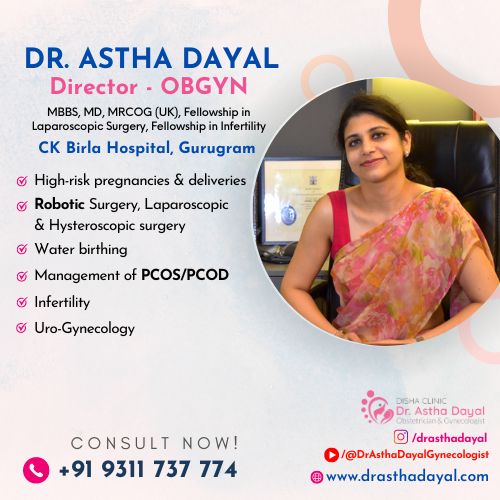The Crucial Role of Gynaecologists in Early Cancer Detection
Gynaecological malignancies are a type of cancer that affects the female reproductive system. Although gynaecological cancers might be alarming, it is comforting to know that many of them are treatable, especially if found early on. Dr. Astha Dayal (Director Obstetrics & Gynaecologist, CK Birla Hospital) provided her expert opinion.
This is where our roles come in; they play a vital role in the early detection of these cancers through regular screenings.
Routine Checkups: Your Best Weapon Against Gynecological Cancers: During your visit to our centre, we will do screenings like pap smears and HPV for cervical cancer and pelvic exams to check for abnormalities in the ovaries, uterus, vagina, and vulva. These screenings can detect precancerous cells or early-stage cancer, allowing for timely intervention and significantly improving treatment outcomes.
At our center, we conduct screenings that typically include:
- Pap smears and HPV tests help find abnormalities in the cervix that can possibly cause cervical cancer.
- Ovarian Cancer Screening: Although no one clear screening test exists for ovarian cancer, pelvic exams, ultrasound TVS along with blood tests like CA-125 can generate suspicion and support early diagnosis.
- Uterine Cancer Screening: Ultrasound , pelvic exams and biopsy of the uterine lining on suspicion can point to uterine cancer.
- Vaginal and Vulvar Cancer Screening: These cancers can be found visually during a pelvic exam.
How Gynecologists Identify and Manage Precancerous Conditions?
Early detection often means identifying and addressing precancerous conditions before they develop into cancer. Gynecologists play a crucial role in this process:
- Abnormal Pap Smear Management: If a Pap smear shows abnormalities, Dr Astha will recommend further testing, like colposcopy and biopsy to determine the cell changes and their severity. Based on the results, they can then devise a treatment plan to remove or destroy precancerous cells, effectively preventing cervical cancer.
- HPV Testing: The human papillomavirus (HPV) is a known risk factor for cervical cancer. HPV testing can help determine the presence of certain HPV strains and guide further management.
- Gynecologist Role in Precancer Treatment: Depending on the type and severity of precancerous cells, your gynecologist might recommend options like cryotherapy, laser treatment, or loop electrosurgical excision procedure (LEEP) to remove the abnormal cells.
Cutting-Edge Diagnostic Tools Gynecologists Use to Detect Cancer Early
Alongside traditional screening methods, gynecologists have access to advanced technologies for early and accurate cancer detection:
- Advanced Gynecological Cancer Screening Techniques: Techniques like liquid-based cytology for Pap smears and combining it with HPV DNA high risk screening can improve the accuracy of detecting abnormalities.
- Imaging Tests for Gynecological Cancers: Imaging tests like ultrasounds, CT scans, and MRIs can provide detailed views of the pelvic organs to identify potential tumors or abnormalities.
- Tumor Marker Blood Tests: While not definitive on their own, blood tests for tumor markers like ca 125, CEA, Ca 19-9, beta HCG, LDH, alpha fetoprotein etc can raise a red flag for potential cancer and be used in conjunction with other diagnostic methods.
- Genetic Testing for Cancer Risk: If you have a strong family history of cancer, your gynecologist might recommend genetic testing to identify potential genetic mutations like BRCA 1 and 2,that increase your risk of developing certain gynecological cancers.
Working Closely with Your Gynaecologist: The Key to Gynecological Cancer Prevention
A trusting partnership with your gynecologist is essential for gynecological cancer prevention:
- Importance of Regular Gynecological Exams: Scheduling regular checkups and screenings allows for early detection of abnormalities and potential intervention before they progress into cancer.
- Communicating Cancer Concerns with Gynecologist: Don’t hesitate to discuss any concerns you might have about your gynecological health, including family history, unusual symptoms, or risk factors. Early communication is key for timely investigation and preventive measures.
- Gynecologist-Patient Partnership in Cancer Prevention: By working together with your gynecologist, you can create a personalized plan for gynecological cancer prevention. This might include lifestyle modifications, vaccination recommendations (like the HPV vaccine), and a tailored screening schedule based on your individual risk factors.
Conclusion: Empower Yourself by Partnering with a Trusted Gynecologist
Gynecologists are your frontline defense against gynecological cancers. By prioritizing regular checkups, openly communicating your concerns, and working together with your gynecologist, you can take charge of your gynecological health and empower yourself with the knowledge and tools for early detection and prevention.
Why choose Dr. Astha Dayal for your gynaecological condition treatment?

Dr. Astha Dayal is a leading gynaecologist with over 20 years of experience in women’s healthcare. Specializing in high-risk pregnancies, infertility, PCOS, and advanced Robotic laparoscopic and hysteroscopic procedures, she is the expert you can trust for comprehensive, compassionate care. Her extensive qualifications, including an MBBS, MS in Obstetrics and Gynecology, MRCOG(London), and fellowships in laparoscopy and infertility, make her uniquely qualified to address even the most complex gynecological conditions. With a patient-centric approach, Dr. Dayal is dedicated to empowering women and delivering exceptional outcomes.
Note : Indicate explicitly that the information on the site is intended for educational purposes only and does not serve as a substitute for professional medical advice. Recommend that users seek medical advice, diagnoses, or treatment from a medical professional or healthcare provider.


